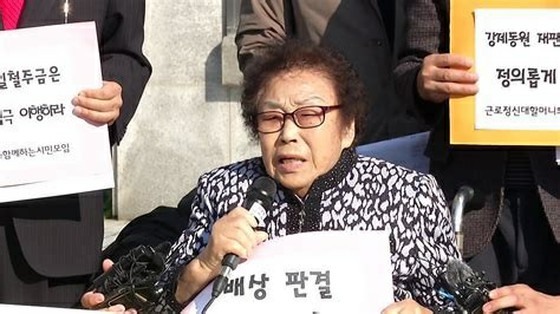  |
Yang, 94, put up a piece of paper with the words "Apologize-Yang Gum-duk" and said, "When I was young, I spent two years in tears at the Mitsubishi factory in Nagoya. Hiding, trembling with fear of death. I still suffer from sequelae and can't sleep at night" she said.
Yang went on to say, "The three years after the Supreme Court of Korea's compensation decision was longer than 30 years. I'm 94 years old. I don't know when I'll die, but a word of apology. Is it so difficult to hear?"
What kind of person is Yang Gum-duk who appeals like this?
Yang is from Naju, Jeollanam-do, in the southwestern part of South Korea. In May 1944, when she was in the sixth grade of elementary school, she recalls being fooled by the words "I'll let you go to junior high school" from a Japanese principal. He said she was in the sixth grade of elementary school, but when he counts back, she was 17 years old, so no longer a child. Recruitment for former members of the Korean Peninsula became possible from September 1944, so it seems that Yang's case was not at least a form of recruitment.
In her autobiography, Yang said she was good at studying and exercising and was a class president. She raised her hand to "go to Japan" because she wanted to go to Japan and go on to junior high school. When she went home and talked, her father was furious, so the next day Yang told her homeroom teacher she wouldn't go to Japan.
However, she was scared when she heard the teacher's words, "If you can't go after being nominated, I will put your parents in the police station. So I secretly took out my father's stamp from the shelf and handed it to my teacher" said Yang.
Then, Yang went to Japan as a member of the Labor Volunteer Corps. A total of 288 underage women, 138 from Jeollanam-do and 150 from Chungcheong-do, are described as being "taken". Yang, who started working at Mitsubishi Heavy Industries' Nagoya Aircraft Factory, was damaged by the "Tonankai Earthquake" at the factory on December 7th, 1944.
"My hometown senior Choi Jung-le and Kim Hyang-nam, who entered 10 minutes before the break, were laid on the collapsed wall and died on the spot" she wrote in her autobiography. This accident seems to have been a lifelong trauma. The earthquake killed six teenage girls from Jeolla-do. “At that time, my left shoulder was injured and I still have sequelae” said Yang, who was trapped in a gap in the collapsed wall that saved her life.
After the end of the war, until she returned to her hometown in October 1945, Yang stated that she "did not receive any wages even though she worked hard "at Mitsubishi Heavy Industries." All the Japanese people's words were 'I know your home address, so I'll definitely send you a monthly salary" she said.
After returning to Japan, "further misfortune" began. It was misunderstood by the people around her that she went as a comfort women, and it became difficult for her to get married, and even after getting married through the introduction of her sister, she was divorced by her husband. "If I don't work, I'll starve and die" said Yang. "I worked hard without resting a day. As a result, I made my six siblings study and get married."
A Korean citizen group began a lawsuit for damages against the Japanese government in 1992, resulting in a loss. After that, when a Japanese heard that she was "looking for someone who was forcibly mobilized at the Mitsubishi factory" Yang said, "I revealed the fact that I was forcibly mobilized."
In March 1999, she filed a lawsuit for damages in a Japanese court, but they were all lost. In 2012, she filed a lawsuit in the Gwangju District Court in South Korea. In November 2018, Yang was confirmed to win the case at the Supreme Court of South Korea. A ruling that ordered Mitsubishi Heavy Industries to pay 100 to 150 million won as a consolation fee per plaintiff, including Yang.
The Japanese government has made this a problem that was resolved in 1965. She revealed that she was not a "volunteer" but a "forcibly drafted". The South Korean government makes a difference in interpretation, but if so, what did South Korea promise with Japan in 1965?
Yang, 94, who has lived in an unfortunate time, South Korea, which has become the world's 10th most developed country, apologized for the delay of the Korean government, which had deposited astronomical money from Japan in 1965. What is the reason for not paying money?
2021/12/02 21:10 KST


